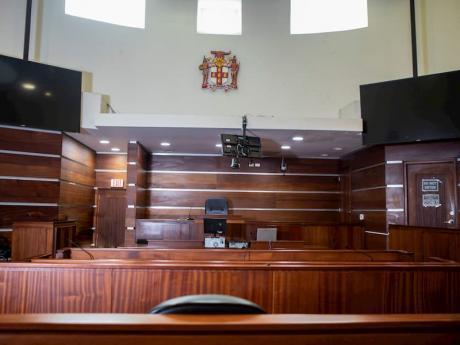Court of Appeal rules against retrial for men convicted of murder 13 years ago
The Court of Appeal, in freeing two of three men who were convicted of murder 13 years ago, said yesterday that it would not order a retrial because they would be severely prejudiced as approximately 20 years would have passed since the crime was committed.
Freed were Omar Dunkley and Jason Coley who were convicted by a jury in April 2011 of the murder of Michael Curtis, otherwise called 'Java', in August Town, St Andrew on July 20, 2004 and were each sentenced to 25 years' imprisonment.
The court highlighted the fact that to date the men had served about 13 years of their sentence and the possibility of a retrial in the near future was hardly likely.
Attorney-at-law Robert Fletcher, who represented Dunkley, and attorney-at-law Anthony Williams, who represented Coley, had argued that the men should have been freed on a no-case submission because of contradictions and material inconsistencies in the evidence of the main witness for the prosecution.
The third man, Omar Blake, who was represented by King's Counsel Valerie Neita Robertson, lost his appeal against his conviction but the court reduced his sentence of 25 years before parole to 16 years.
The prosecution's case was that the deceased was fatally shot at his girlfriend's house on Reserve Road in August Town.
A witness had testified that on the evening of the murder, the three applicants were among a group of men in August Town.
He said he heard Blake saying “a long time he did not mek a duppy.”
The witness said when the deceased arrived home, Blake went across to where he was and began questioning him.
Later in the evening, the three applicants jumped the fence and went into the yard where the deceased was and the witness said he heard gunshots coming from the yard.
The applicants, in their defence, had denied being at the scene and indicated that the witness was lying.
Several grounds of appeal were filed and the attorneys-at-law argued that the judge erred in failing to accept the no-case submission which was made at the end of the prosecution's case.
In dismissing Blake's appeal, the court comprising Justice Frank Williams, Justice Marcia Dunbar Green and Justice Georgiana Fraser ruled that due consideration was given to the grounds of his appeal advanced by King's Counsel which were detailed and well articulated but the court was unable to find any basis upon which leave to appeal the conviction could be granted.
The court allowed the appeal against the sentence.
The men had filed several grounds of appeal contending that the trial judge erred in her directions to the jury.
Fletcher in his submissions had argued that the contradictions were stark weaknesses in the prosecution's case yet nowhere in the directions on identification did the judge highlight them as actual or potential weaknesses to the jury.
The court in accepting Fletcher's submissions said the error deprived Dunkley of a real chance of an acquittal.
Williams in his submissions drew the court's attention to contradictions in the evidence which he said were glaring and went to the root of identification and the credibility of the witness.
He submitted that the trial judge failed to assist the jury in analysing the effects of the contradictions.
The court, in its response, said that the sole eyewitness for the prosecution gave conflicting evidence in critical aspects of the case against Coley and those contradictions necessitated proper directions from the judge.
The court said the judge erred in failing to guide and assist the jury in critically analysing that evidence, the result of which was a failure to place before the jury issues of fact which were particularly relevant to Coley.
“Given these material omissions, the verdict against Mr Coley was unsafe and could not stand,” the court ruled.
Crown Counsel Donnette Henriques, in her response, accepted that there were contradictions in aspects of the evidence given by the witness.
She argued that the judge had addressed them and explained how the jury ought to treat them.
The court, in allowing the two men's appeal against conviction, said in its 70-page judgment that while “the prevalence of this type of offence cannot be overstated, we have found no reason that would justify a retrial of the case against either of these applicants.”
“Messrs Dunkley and Coley would be severely prejudiced by a new trial, as approximately 20 years would have passed since the crime was committed; they would have served about 13 years of their sentence to date; and the possibility of a re-trial date, in the near future, is hardly likely. Furthermore, the trial was long and tedious caused in no small measure by the fact that the principal witness had a serious speech impediment. Therefore, the resources likely to be incurred for a new trial would be enormous. In all these circumstances, the interests of justice would be better served if no retrial was ordered,” the court ruled.
- Barbara Gayle
Follow The Gleaner on Twitter and Instagram @JamaicaGleaner and on Facebook @GleanerJamaica. Send us a message on WhatsApp at 1-876-499-0169 or email us at onlinefeedback@gleanerjm.com or editors@gleanerjm.com.

